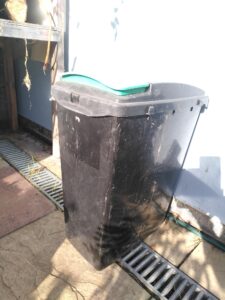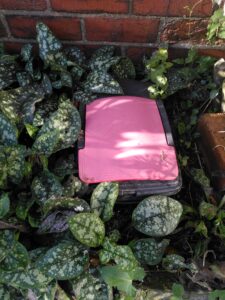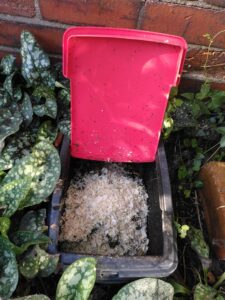We made a dog poo-composter for the garden! We do regular ‘worm counts’ https://www.wormcount.com/ and so we are reasonably sure that their poo hasn’t too many nastys in. However, the worm count will only really look at round worms, tape worms and hook worms and these are easily dealt with once you know that they are there, however, there are also single cell protozoans parasites which produce cysts that persist in the environment similar to those of the round and tape worms but which are not treatable by wormers. Once out in the environment most of these cysts denature after a year or so rendering them harmless.See the environmentally friendly disposal of pet waste article. We only put poo from the garden into the composter, we just scoop it up on a shovel off the patio or lawn and in it goes. Anything that happens ‘off premises’ goes in the bin. If we had a bigger dog poo-composter we could bring it home and assuming it was in a totally biodegradable bag (e.g. potato starch) this too would compost.
We already had a strong plastic bin with a lid about 50sx37x57cms. We drilled holes about 1cm in diameter in the base and half way up the sides

and then buried it almost up to the top in the garden and then we were up and running.

In addition to the poo, we add a scoop of sawdust every now and again.

When we first had Frankie, she had a succession of worms, we used chemical wormer – I’m sorry to say. After worm treatment we put her poo in the municipal bin for two weeks before adding it to the dog poo-composter otherwise the wormers would have killed the micro organisms in the compost and it would have stopped working. We have an incinerator in Shrewsbury so the contaminated poo would have been incinerated.
The dog-poo-composter has now been up and running for about a year and it’s not yet full despite the best efforts of our two dogs. It’s really easy! We have another of the same sort of plastic bins (dunelm!) and I’m tempted to turn this into anther composter. Then when the first is full we can leave it to ‘fallow’ for a year so that any encysted pathogens are rendered harmless and we would be able to safely empty the contents on the garden. I wouldn’t take it to the allotment and put it on food plants but for the back garden I’m sure dog poo compost will be grand. If we had two bins we would have the capacity to bring any ‘off premesis’ poo back home and then it would be totally out of the waste stream and safe. Two small bins would be easier to accommodate in our relatively small garden too…
